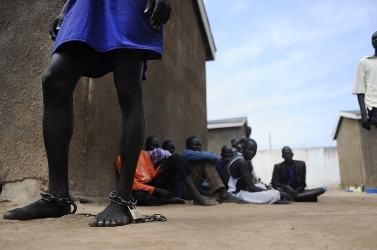France and EU calls for suspension of S. Sudan death penalty
October 11, 2012 (JUBA) – The French government as part of the European Union has called for an immediate moratorium on the death penalty in South Sudan, saying the practice provides no alternative to fighting crime in the new nation.

An estimated 95 percent of prisoners in the country, according to South Sudan’s Justice Ministry, go through the criminal justice system without legal aid, while only six inmates have reportedly received government legal aid, ever since the system was established in 2006.
“Although there is a constitutional right to government-funded legal aid for cases in which the death penalty could apply, most prisoners are not aware of such rights and the legal aid systems has yet to function effectively,” partly reads the French embassy statement.
Although the majority of the world’s countries have either abolished or suspended the death penalty, 57 states or territories, including South Sudan, still apply the practice.
On August 21, two men were hanged in Juba Central Prison, while a total of at least eight people have reportedly been executed in South Sudan in the 13 months since independence, with close to 200 prisoners said to be on death row.
“The loss of human life it [death penalty] entails is irreparable, and no legal system is immune from miscarriages of justice. Furthermore, there is no clear evidence that the death penalty is a useful instrument in fighting crime,” further adds the statement.
In recent months, there have been widespread calls for the abolition of the death penalty in South Sudan, with human rights groups and Comboni missionaries leading the campaign.
The South Sudan Law Society (SSLS), in its campaign against the death penalty, urged government to adopt “potential” paths for reform, saying South Sudanese law requires the Supreme Court to review and confirm all death sentences.
“There is evidence that this process is already helping to limit the number of executions, at least in cases involving egregious miscarriages of justice,” said David Deng, a researcher with SSLS.
Under the customary laws of most South Sudan communities, people found guilty of murder must pay compensation to the family of the deceased, a remedy reportedly designed to restore relationships rather than to exact retribution by taking away the wrongdoer’s life.
However, chairperson of South Sudan Human Rights Commission (SSHRC), Lawrence Korbandy, has warned against calls for abolition of death penalty in the country, saying the process should be handled cautiously, to avoid revenge killings.
(ST)
